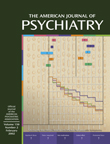Suicide Attempt After Use of Herbal Diet Pill
To the Editor: Ma-huang, or ephedra, an extract of the plant species Ephedra sinica, grows mainly in Mongolia near the Chinese border. Its main compounds are alkaloids of the 2-aminophenylpropane type, l-ephedrine and d-pseudoephedrine (1), and it is found in many over-the-counter weight-loss aids. There have been reports (2–5) of significant adverse health consequences associated with its use. We report a case of suicide attempt and organically induced mood disorder associated with use of a diet pill containing Ma-huang.
Ms. A, a 32-year-old mother of two children, was brought to the hospital in a comatose state after she had swallowed 80 tablets of acetaminophen, 60 tablets of an herbal weight-loss supplement, and an unknown number of multivitamin tablets. She had no past history of mood disorders, according to both herself and her husband. She had started using the herbal weight-loss supplement about 2 months before her hospitalization. She reported that since that time, she had been feeling depressed most of the time, had been irritable, and had poor impulse control at work and at home. She had yelled at her boss and at her husband and daughter and had thrown things at them during moments of rage. She also reported frequent suicidal ideation and feelings of guilt. She had more energy and slept less—no more than 3 hours a night. She also heard voices calling her name.
After the overdose, Ms. A was admitted into the intensive care unit, where supportive measures were administered. Her serum acetaminophen level was 182.31 μg/ml at admission and decreased to <1.00 μg/ml 2 days later. Her level of aspartate transaminase went from 239 U/liter at admission to 872 U/liter the next day, then down to 26 U/liter a week later. Her alanine transaminase level went up from 243 U/liter at admission to 971 U/liter the next day, then decreased to 530 U/liter a week later. Her LDH level was 1452 U/liter at admission.
After Ms. A regained consciousness, the results of a psychiatric evaluation revealed a slightly overweight woman with pressured speech, flight of ideas, an irritable and annoyed mood, and auditory hallucinations. These symptoms gradually subsided over 5 days without the administration of psychotropic medication. At the 5-month follow-up, Ms. A was euthymic, with no suicidal ideation, and was taking no psychotropic medication.
The product label for the herbal weight-loss supplement that the patient took states that a two-tablet serving contains 324 mg of Ma-huang extract, standardized for 20 mg of ephedrine alkaloids. The recommended dose is two tablets per day. Our patient said that she had been taking four tablets per day for 2 months. There are many reports in the literature about the adverse effects of Ma-huang, including mania (2, 6), psychosis (4), hypertension (3), tachycardia (3), and myocardial infarction. Many deaths reported to the Food and Drug Administration (FDA) have been attributed to this herbal substance (4). The users of products containing Ma-huang are increasing in number, owing in large part to the fact that it is an herbal, or “natural,” drug and thus is perceived as being safe. Some individuals exceed the recommended dose when they are self-medicating, and this can contribute further to adverse effects. Unfortunately, there are not enough studies of the safety and efficacy of this herb. Until we establish some kind of reporting system that allows the FDA to keep track of adverse reactions to Ma-huang, there will be many unidentified adverse events. That makes questioning patients regarding the use of over-the-counter remedies essential.
1. Greenberg SB: PDR for Herbal Medicines, 1st ed, 1998, pp 826-827Google Scholar
2. Capwell RR: Ephedrine-induced mania from an herbal diet supplement (letter). Am J Psychiatry 1995; 152:647Medline, Google Scholar
3. Crone CC, Wise TN: Use of herbal medicines among consultation-liaison populations. Psychosomatics 1998; 39:3-13Crossref, Medline, Google Scholar
4. Jacobs KM, Hirsch KA: Psychiatric complications of Ma-huang. Psychosomatics 2000; 41:58-62Crossref, Medline, Google Scholar
5. Pies R: Adverse neuropsychiatric reactions to herbal and over-the-counter “antidepressants.” J Clin Psychiatry 2000; 61:815-820Crossref, Medline, Google Scholar
6. Emmanuel NP, Jones C, Lydiard RB: Use of herbal products and symptoms of bipolar disorder (letter). Psychiatry 1998; 155:1627Google Scholar



